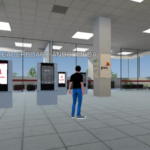
Brought to you by Singapore Exhibition Services
Getting one’s e-mail, calendar and other apps on the go today is a given for many modern professionals, with maturing enterprise mobility technologies and improved security in recent year.
Also advanced is the idea of BYOD (bring-your-own-device) these days, with many enterprise apps running on a wide variety of operating systems.
The next challenge is enabling mobile workers to do more than simply replicate what they do in the office while on the road. The idea is to expand one’s work place as one travels, rather than just bringing the workstation with you.
Can enterprise mobility provide contextual information, for example? Can it automatically provide users with information that is relevant to them based on where they are?
If a user is travelling to a country for the first time, can an enterprise app detect his location and provide a briefing of the important customers one has? Can it pull information from the vast knowledge base in the corporate archives to better prepare a sales team for a presentation by offering a substantial background briefing?
Imagine turning up, say, in Thailand for the first time and having the information on a potential customer pull up immediately on your laptop.
Along with that, some background on rivals in the country as well as competitive advantage and weaknesses, all delivered without having you manually look up all the different directories and folders in your corporate server or get separate briefings from various local executives.
For that to work, a number of technologies have to come together. Obviously, mobile technology like portable laptops or tablets will be the consumption devices. Also crucial are software-defined communications that enable mobile workers to easily keep in touch whether their contacts call them on a fixed line or mobile number.
That’s not forgetting, of course, fast wireless connections and cloud technologies providing information at the fingertips of travelling executives. Indeed, the reach and scale of cloud computing has transformed the way people work. For those on the road all the time, cloud-based tools have never been easier or more powerful.
What is perhaps less common today is the ability for the cloud to deliver corporate information automatically down the pipe, the way that Google Now “knows” where a user is and what his habits are. For example, it could automatically inform a user how long it would take to travel to a frequently-visited place.
Could enterprise mobility offer the same in future? The key to this could be artificial intelligence (AI). Already linked with so many aspects of tomorrow’s world, AI could be more intertwined with enterprise mobility in the years ahead, say experts.
It could bring much-needed contextual information on the go, empowering users more than simply replicating their office experience. By having a sense of time and place, a user travelling around the world can get useful information relevant to him.
And more than a passive consumer of information, he can contribute back to the intelligent data trove as well. As he visits new places, speaks to customers or records notes of his meetings, an advanced system can automatically archive this and make sense of the raw data for the next contextual user.
Key to this, however, is transforming processes digitally. Already, the mobile workforce has changed many concepts about productivity and being desk-bound in an office. Yet, the way forward requires enterprises to go even further in embracing new styles of work.
A mindset change may be needed as enterprises evolve in the so-called “gig economy”, where independent contractors may perform a large portion of the work in a business. In the United States and Europe, between 20 and 30 per cent of people work independently, according to study by consultancy firm McKinsey Global Institute.
What this means is that enterprises will be increasingly working with third-parties that may be based around the world, possibly at home or at a coffee shop with free Wi-Fi for infrastructure and a cuppa for fuel.
How does a company empower such individuals? How can it maximise the capabilities of such independent workers who work anywhere, with fluid contracts and flexible arrangements?
There might be challenges with security, with external parties requiring access to corporate information. At the same, they have to accorded the tools to get the jobs done, even if they are on the move all the time.
The challenges could make BYOD seem like a cake walk. Yet, the opportunity that the new flexible arrangements could offer, along with improvements that enterprise mobility will bring to employees in the years ahead, will provide real incentives to corporations to transform the idea of going to work in the future.
At EnterpriseIT2017, visitors can preview the latest enterprise mobility solutions from Aarenet, Aver, Cal4Care, CISCO, Connect Seven Solution, Fanvil Technology, Grandstream Networks, IP-COM Networks, Telo Systems, Sennheiser, Throughwave, and Xtend Technologies.
EnterpriseIT2017 will be held at Marina Bay Sands in Singapore from 23-25 May 2017. Visit www.EnterpriseIT-Asia.com for details and to pre-register your visit.





